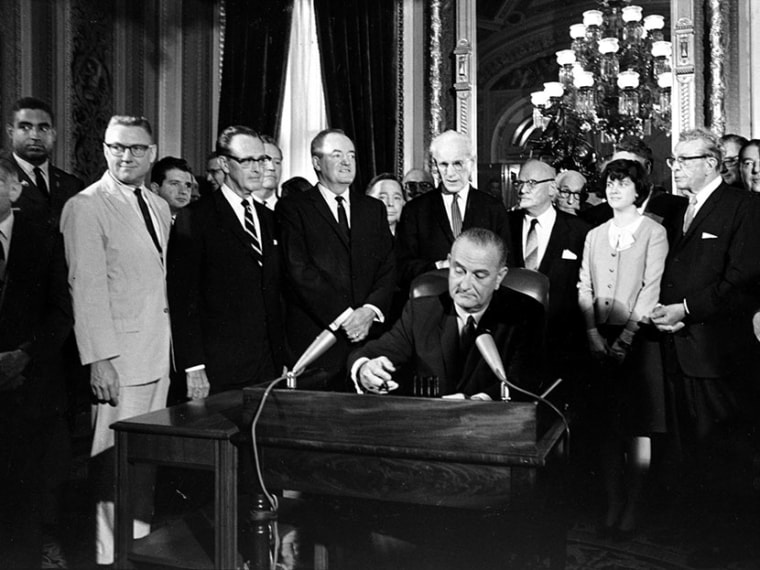Flanked by famous civil rights heroes like Martin Luther King Jr. and Rosa Parks, President Johnson signed the Voting Rights Act into law 48 years ago Tuesday, creating a tool that gave racial minorities protection against the voter suppression efforts they'd faced for years."Today is a triumph for freedom as huge as any victory that has ever been won on any battlefield. Yet to seize the meaning of this day, we must recall darker times," Johnson said on August 6, 1965.At the time, discrimination took the form of literacy tests and bubble-counting on soap bars. Nearly five decades later, a new generation of civil rights activists are fighting a much more subtle form of suppression, often referred to as the new Jim Crow, which includes provisions like voter ID requirements and limits on voter registration that critics argue target minority voters.“Jim Crow is alive, and it’s dressed in a Brooks Brothers suit, my friend, instead of a white robe,” Myrlie Evers-Williams, widow of slain activist Medgar Evers, said in June, just weeks before the Supreme Court weakened the VRA in its Shelby County v. Holder decision.The majority in the Supreme Court decision argued that times have changed in the South and other areas covered by Section 4 of the VRA and the law is unnecessary. But civil rights leaders point to the actions taken in the wake of that ruling as proof that the states still need a stricter standard of federal oversight.In Selma, Ala., where activists like Democratic Congressman John Lewis of Georgia were beaten during protests for the right to vote, many civil rights leaders consider August 6 National Voting Rights Day.Democrats used the anniversary Tuesday to highlight the history of the suffrage and civil rights movement in America, unveiling a new website that plots the battles of the past and the present.Those leaders hope the march will put pressure on Congress to move forward on legislation to restore Section 4 of the Voting Rights Act. Republican Rep. Jim Sensenbrenner has led the charge for his party, but it's still unclear what that solution might look like.As Lewis said in testimony before a Senate Committee on the matter last month, “the Voting Rights Act is needed now like never before.”TexasAttorney General Greg Abbott became the first state official to announce he would reinstate measures that had previously been blocked by the VRA just hours after the Supreme Court decision.The Justice Department has since urged a state court to reinstate preclearance requirements for Texas under a different part of the law that subjects states with recent intentionally discriminatory behavior to preclearance. Abbott cried foul, accusing the Obama administration of partisanship, an argument debunked by at least one civil rights lawyer.The legal battle rests in the hands of a San Antonio federal court.FloridaA ruling issued late last month in response to the Supreme Court's VRA decision has cleared the way for Governor Rick Scott to resume a much-maligned voter purge. That purge, first initiated in months leading up to the 2012 election, drew sharp criticism from elections supervisors. Some still appear hesitant about the new purge, based on past experiences.“It was sloppy, it was slapdash and it was inaccurate,” Polk County Supervisor of Elections Lori Edwards told the Miami Herald. “They were sending us names of people to remove because they were born in Puerto Rico. It was disgusting.”
Although the bill still awaits the governor's signature, North Carolina is poised to enact a sweeping piece of election legislation that's been characterized by some as the most egregious in recent memory. The law institutes a strict new voter ID requirement, shortens the early voting period, ends pre-registration for 16- and 17-year-olds, and more. The state's Democratic Attorney General Roy Cooper opposes the law, worried it could cost the state millions to implement, and has urged Governor Pat McCrory to veto it. Another 12,000 people have signed a petition urging the same. The local chapter of the NAACP requested a meeting with McCrory, hoping to convince him to veto the legislation, although so far McCrory has not responded, according to WRAL.McCrory had indicated he would sign the bill even though, as of last week, he had not yet read it. Under state law, he has 30 days to take action on the legislation, or it becomes law by default.
